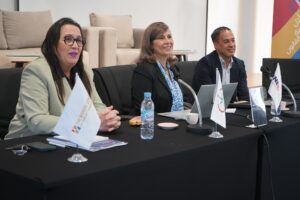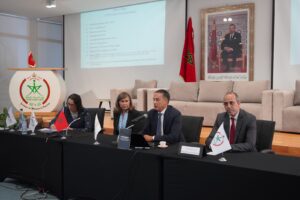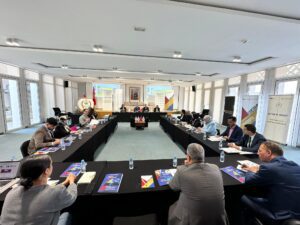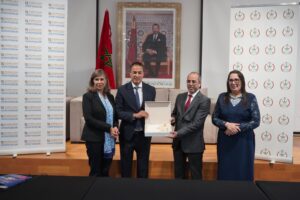
From May 7 to 10, 2025, it was a great honor together with my colleague Mr. Noufal Abboud to co-facilitate a three-day training workshop in Rabat. This intensive session, organized under the #ActionAlWassit program by the Nordic Center for Conflict Transformation (NCCT) and in partnership with the Mediator Institution of the Kingdom of Morocco (aka, Al Wassit or the Moroccan Ombudsman) and with the support of the National Endowment for Democracy (NED), brought together key staff of the Mediator’s Institution for an in-depth exploration of conflict transformation, adaptive governance, and the role of the ombudsman in peace sustainability.

Our shared intention extended beyond the delivery of training. We aimed to co-create a space where institutional actors could critically reflect on their role in upholding transparency, accountability, and the rule of law, while strengthening the institutional culture of conflict transformation and inclusive governance. Since 2020, NCCT has been a partnership to the Mediator Institution, working to reinforce the responsiveness of public institutions in Morocco and improve their capacity to act as trusted, rights-based mediators between citizens and the public administration.

I. A Diagnostic for Sustainable conflict prevention: Mediation, negotiation, SDG Risks, and Institutional Resilience
At the heart of our workshop was the UN Sustaining Peace framework, which calls for proactive, inclusive, and locally owned strategies that tackle the root causes of conflict. Rather than waiting for crises to erupt, this approach goes along the NCCT’s conflict transformation approach that promotes long-term institutional resilience by addressing structural vulnerabilities and promoting trust.
We introduced the Sustaining Peace Marker as a practical tool for program design, evaluation, and strategic planning emphasizing conflict sensitivity, stakeholder inclusion, and institutional transparency. This methodology proved particularly relevant for ombudsman institutions, whose mandate places them at the intersection of justice, governance, and citizen engagement.
A central component of the workshop was a participatory risk mapping exercise, examining all 17 Sustainable Development Goals (SDGs) to identify potential conflict drivers and institutional blind spots. Participants collectively assessed risks related to marginalization, service delivery gaps, and social grievances – then discussed how adaptive and inclusive governance can mitigate these through early response and structural reforms.
II. Embedding Conflict Transformation in Public Institutions
Over three days, we introduced key concepts of conflict transformation – from Johan Galtung’s distinction between negative and positive peace to John Paul Lederach’s emphasis on reconciliation, empathy, and social healing. But more than theory, this was an applied process rooted in the lived realities of Morocco’s public service and the citizens it serves.
With tools such as conflict tree analysis, stakeholder mapping, and nonviolent advocacy planning, key staff of Mediator explored local case studies, applying these methodologies to real institutional challenges. A special focus was given to adaptive mediation, a flexible, context-sensitive approach that values listening, empathy, and transparency in resolving disputes between citizens and public administration.
This practical approach aligns closely with the principles of #openGovernment, where responsiveness, transparency, and participatory problem-solving become foundational elements of institutional behavior.

III. A Moroccan Lens on Peacebuilding
One of the most powerful aspects of the workshop was how participants brought global peacebuilding frameworks into dialogue with Moroccan values, traditions, and current realities. We discussed how peace education could be introduced into schools and how civil society could serve both as a catalyst for accountability and a bridge builder between citizens and the public administration.
It became clear that sustaining peace is not a one-size-fits-all process – it requires technical knowledge, cultural humility, trust-building, and long-term partnership. The active engagement, openness, and commitment shown by the participants reaffirmed our belief that meaningful institutional development must emerge from within.
A Poetic Closure and a Shared Commitment
On the final day, we were touched by a spontaneous act of solidarity: a poem composed and performed by a participant, reflecting the emotional and professional journey we had walked together. It was a moving reminder that institutional transformation is not only about policies and tools – it is also about relationships, shared values, and a collective commitment to serve with integrity.
As I left Rabat, I felt renewed hope that with the right tools, shared vision, and mutual respect, public institutions in Morocco and across the region can become genuine pillars of peace, justice, and transparency.
Our sincere thanks go to the Mediator of the Kingdom for their partnership and to every participant who contributed their voice, experience, and insight. The NCCT team remains fully committed to supporting this collective initiatives through #ActionAlWassit and beyond as we work together to advance justice, conflict transformation, transparency and sustainable peace from the inside out.
